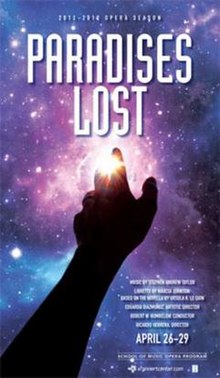| "Paradises Lost" | |
|---|---|
| Short story by Ursula K. Le Guin | |
 A poster for the 2012 opera adaptation of Paradises Lost | |
| Country | United States |
| Language | English |
| Genre(s) | Science fiction |
| Publication | |
| Published in | The Birthday of the World and Other Stories |
| Publisher | HarperCollins[1] |
| Publication date | 2002 |
Paradises Lost is a science fiction novella by American author Ursula K. Le Guin. It was first published in 2002 as a part of the collection The Birthday of the World. It is set during a multigenerational voyage from Earth to a potentially habitable planet. The protagonists, Liu Hsing and Nova Luis, are members of the fifth generation born on the ship. The story follows them as they deal with members of a religious cult who do not believe in the ship stopping at its intended destination. They also face a crisis brought on by a drastic change in the ship's schedule. The novella has since been anthologized as well as adapted into an opera of the same name.
The novella explores the isolation brought on by space travel, as well as themes of religion and utopia. It contains elements of ecocriticism, or a critique of the idea that human beings are altogether separate from their natural environment. The novella and the collections it was published in received high praise from commentators. For its generation ship setting and examination of utopia, critics compared it to other Le Guin works such as "Newton's Sleep", and The Telling, as well as to the works of Gene Wolfe and Molly Gloss. Scholar Max Haiven described the novella as "a chastening lesson in both the potential and the perils of freedom",[2] while author Margaret Atwood said that it "shows us our own natural world as a freshly discovered Paradise Regained, a realm of wonder".[3]